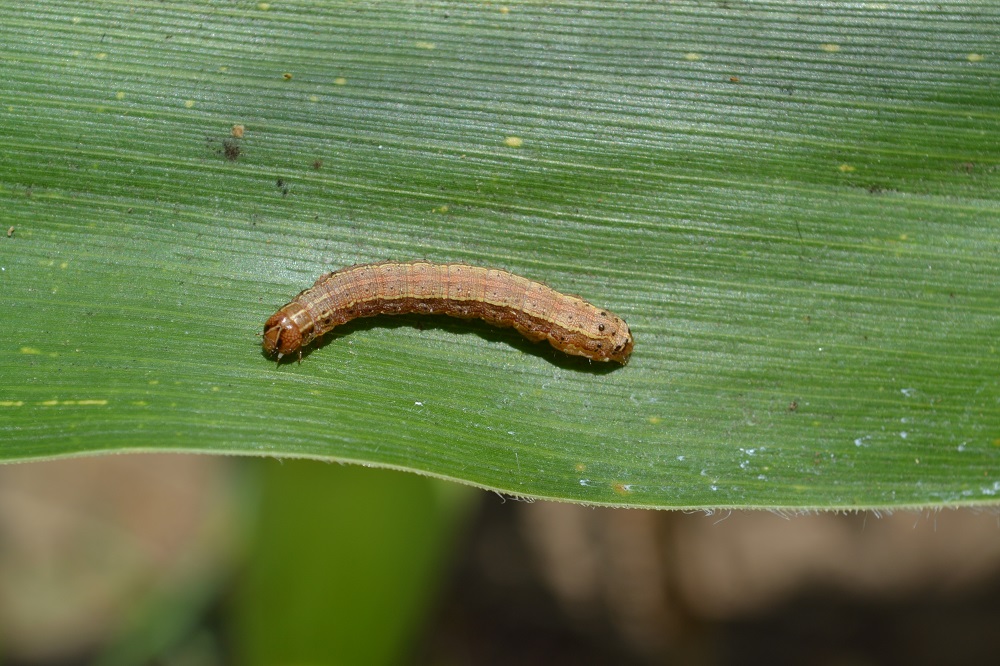
CABI South East Asia (CABI-SEA) has hosted online training on the devastating fall armyworm (FAW) – looking at the diagnostics, ecology, surveillance and management of the pest in the Philippines, writes Dr Sathis Sri Thanarajoo and Mr Muhammad Faheem.
Forty-nine participants from various departments, including Philippine Rice Research Institute (PhilRice), the Department of Agriculture, Regional Crop Pest Management Centres, Local Government Units, the Crop Protection Division, the Food and Agriculture Organization of the United Nations (FAO), and CABI, joined the three-day training which was chaired by Mr Faheem – Integrated Crop Management Advisor based at the CABI-SEA centre in Selangor, Malaysia.
The training was divided into four sessions and included 10 presentations and one online exercise based upon a greater understanding of the field diagnosis of the FAW, and its ecology and surveillance, forecasting and management in South East Asia, particularly in the Philippines.
Participants also had the chance to discuss with the speakers examples of best practice as part of the training, which was coordinated in collaboration with the Philippine Rice Research Institute (PhilRice) – under the project ‘Preparedness for FAW management in rice crop’ – that was approved by the Department of Agriculture Bureau of Agricultural Research (DA-BAR).
The presentations by CABI scientists were:
‘Field diagnosis of FAW’, ‘Understanding the pest’, ‘Risk factor analysis for management of FAW’, ‘Non-chemical control of FAW’, ‘Chemical control and its restrictions’, ‘FAW information resources’, and ‘Armyworm recognition apps’, presented by Mr Muhammad Faheem.
‘Analysis of weather data in relation to FAW abundance/ forecasting (PRISE and other tools)’, presented by Dr Bryony Taylor and Ms Suzy Wood from CABI centre: United Kingdom.
‘Different types of tool for surveillance of FAW including FAMEWS’, presented by Dr Malvika Chaudhary from CABI centre: India.
‘FAW in rice – is there a potential threat?’, presented by Dr Sivapragasam Annamalai from CABI centre: Malaysia.
‘Diversity of FAW Natural Enemies and their role in management of FAW’, presented by Ms Léna Durocher-Granger from CABI based in the Netherlands.

On the first day, Mr Faheem focused on how to give an accurate diagnosis of FAW through an analysis of its morphological characteristics. This included looking at its features and how we can differentiate the FAW from similar caterpillar pests on the same crop. An online exercise on the diagnosis of the FAW life stages and damage symptoms was then completed by all participants.
Dr Taylor and Ms Suzy presented on how to forecast the arrival and presence of the FAW in a particular area through weather, geographic and pest data using advanced tools utilised by CABI-led projects such as the Pest Risk Information Service (PRISE).
On the second day, Dr Chaudhary spoke about the different types of digital tools available for the surveillance of the FAW including the Fall Armyworm Monitoring and Early Warning System (FAMEWS) from the FAO.
Dr Sivapragasam Annamalai, in his presentation on the potential threats of the FAW on rice, emphasized that outbreaks of pests are not always common and that they occur due to disruptions in the ecological balance due to biotic, abiotic and human factors.
It is important to understand the underlying host plant defence systems and factors that compromise the immunity of plants against the FAW, Dr Sivapragasam Annamalai pointed out. Later Mr Faheem explained about the important pest risk factors to be assessed and analysed to understand the probability of the FAW’s introduction in an area and its management.
On the final day, Mr Faheem shared knowledge on the pest management flow which is advised to be adopted – showing the example of CABI’s Pest Management Decision Guides (PMDGs) of FAW on maize and rice. He also highlighted the need to choose safer options for pest management, as they are more effective in the long run and more environmentally friendly.
He also provided details of the various information resources available from CABI. These included the Invasive Species Compendium (ISC), the Fall armyworm portal, the Fall armyworm Research Collaboration Portal and agriRxiv. Mr Faheem also spoke about the pros and cons of different FAW recognition applications such as ObsIdentify – Nondo, PlantVillage Nuru, Plantix and AgrioShield.
Ms Durocher-Granger highlighted that good knowledge on natural enemies to fight the FAW will also assist in the decision-making process, as part of Integrated Pest Management (IPM) plans, carried out by smallholder farmers.
Apart from explaining the categories of biological control methods; classical, augmentation and conservation, she further provided suggestions for field sampling in rice using quadrat in a randomized sampling method.
She said, “Farmers are the end-users. It is important, therefore, to integrate them in research from the beginning to understand in the socio-economic context, acceptance level and other factors so that we can find solutions together.”
The training ended with participants sharing their thoughts and appreciation on the overall training content and expressed their interest for future collaborations.
Ms Evelyn Valdez, the Senior Science Research Specialist, PhilRice, thanked the CABI team, especially the trainers for sharing their knowledge. She remarked that the training served as basis for formulating the management strategies for invasions of the FAW locally.
Dr Sivapragasam Annamalai also thanked all the participants and encouraged them to try out the tools introduced in the training. Mr Faheem ended the training by reiterating the prospect of further collaboration to mitigate and manage the impacts of the FAW.
Additional information
Find out more about CABI’s work in South East Asia from its regional centre page in Malaysia.
2 Comments
Leave a Reply
Related News & Blogs
Biological control in action: Zambia’s field days on fighting fall armyworm
Experts from CABI recently held two field days and an expo in Zambia, showcasing innovative approaches to pest management to 584 farmers, agro-dealers and other stakeholders to help raise awareness of approaches to tackle the invasive fall armyworm (Sp…
11 June 2025





Thank you CABI for the excellent training on FAW management. We look forward to the continued support and assistance to manage FAW in Rice, in the Philippines. Ravi Joshi.
Hi CABI, we have infestation in sugarcane. Any chance the recording will be available for review?